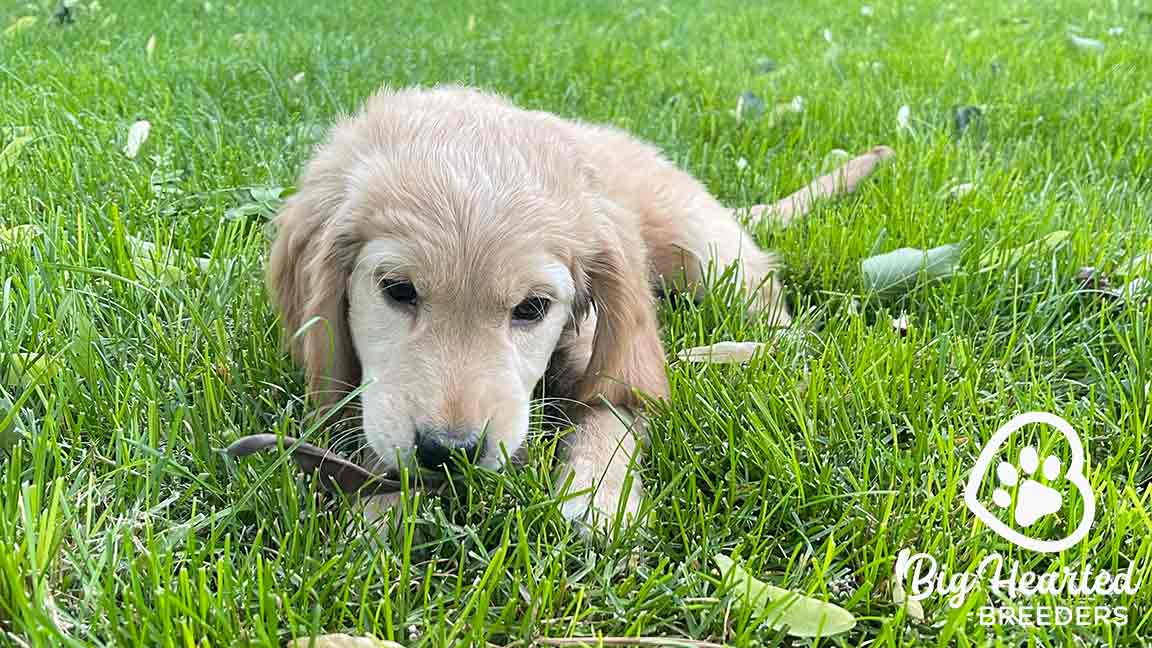Are Dogs Carnivores? The Truth About Your Pup’s Diet
Are Dogs Carnivores? The Truth About Your Pup’s Diet
One of the most common questions new puppy parents ask us at Big Hearted Breeders is, “Are dogs carnivores?” At first glance, the answer seems obvious: dogs love meat, so of course they must be carnivores. But nutrition isn’t always that simple. Dogs share many traits with meat-eating animals, but they also have digestive adaptations that allow them to benefit from other foods.
Understanding the science behind your pup’s diet will not only help you feel confident in what you feed but also set your puppy up for a lifetime of health.
The Science Behind Dogs as Carnivores
 Dogs belong to the order Carnivora, a group that includes wolves, lions, bears, and even raccoons. Despite the name, not every animal in this order eats only meat. For example, giant pandas are technically part of Carnivora but eat mostly bamboo.
Dogs belong to the order Carnivora, a group that includes wolves, lions, bears, and even raccoons. Despite the name, not every animal in this order eats only meat. For example, giant pandas are technically part of Carnivora but eat mostly bamboo.
Cats, on the other hand, are obligate carnivores, meaning they must eat meat to survive. Dogs are different. They are considered facultative carnivores, animals whose bodies are designed for meat but that can also digest plant material and carbohydrates when needed.
This flexibility is part of what allowed dogs to thrive alongside humans for thousands of years. While wolves hunted primarily for prey, early domesticated dogs survived on a mix of meat scraps and whatever grains, vegetables, or leftovers people provided.
So, are dogs carnivores? Yes, but not in the strictest sense. They are carnivores with an impressive ability to process other foods in moderation.
What Makes Dogs Carnivores by Design?
Even though dogs can eat more than meat, their biology still points strongly toward a carnivorous foundation:
- Teeth and jaws: Dogs have sharp, pointed teeth designed for ripping and tearing meat, not flat molars like herbivores.
- Digestive tract: Their shorter intestinal tracts are better suited to digesting protein and fat quickly, unlike the long, complex systems herbivores need to break down plants.
- Enzymes: Dogs produce enzymes that help them break down protein and fat more efficiently than starches.
This doesn’t mean carbohydrates are harmful, but it does mean meat and fat should always make up the core of a healthy diet.

Why Dogs Benefit from More Than Meat
While dogs thrive on protein, research shows they also benefit from certain plant-based ingredients. Carbohydrates can be a source of quick energy, while fruits and vegetables provide vitamins, minerals, and fiber that support digestion.
For example:
- Brown rice adds digestible energy and gentle fiber.
- Sweet potatoes provide beta-carotene and antioxidants.
- Blueberries and spinach add natural sources of vitamins C and K.
In moderation, these ingredients don’t replace protein but rather complement it, giving dogs a more complete nutritional profile.
The Role of Protein and Fat
Protein and fat remain the stars of the canine diet:
- Protein builds muscles, supports organs, and repairs tissues. Puppies, in particular, need plenty of high-quality protein to support growth.
- Fat provides concentrated energy and helps absorb fat-soluble vitamins. It also keeps skin and coats healthy.
- Omega-3 and Omega-6 fatty acids are especially important for brain development, immunity, and inflammation balance.
Without enough protein and fat, dogs may develop poor coat quality, weakened immune systems, or growth problems.
Why We Trust pawTree for Our Puppies

At Big Hearted Breeders, we believe nutrition is one of the best gifts you can give your pup. That’s why we choose pawTree’s recipes. Their formulas reflect the science of dogs as facultative carnivores, emphasizing real animal protein as the first ingredient and complementing it with wholesome grains, fruits, and vegetables.
One of our favorites is pawTree’s Real Whitefish & Brown Rice Recipe. It provides lean, digestible protein while supporting energy and digestive health. To ensure our puppies get the essential fatty acids their bodies can’t produce on their own, we add pawTree’s Wild Alaskan Salmon & Pollock Oil. This powerhouse supplement delivers a superior blend of Omega-3s, including EPA and DHA, which support brain development, joint health, and shiny coats.
Our feeding routine makes it simple: morning and evening meals of Real Whitefish & Brown Rice with a pump of Salmon & Pollock Oil and a sprinkle of pawPairings. This ensures every pup grows up with all-natural balanced nutrition, a glossy coat, and a strong immune system.
Are Dogs Carnivores or Omnivores?
So, are dogs carnivores or omnivores? This is where confusion often sets in. Because dogs can eat plants and grains, some people assume they’re omnivores. But unlike true omnivores such as humans, dogs still depend on meat as their primary fuel source.
A better way to think of it is this: dogs are carnivores that can adapt. Their bodies are optimized for protein and fat, but have enough flexibility to make use of other foods when available. This evolutionary adaptability is part of what has allowed dogs to live alongside us for so long.
Feeding Your Dog Like a Carnivore
 For new puppy parents, the takeaway is clear: make animal protein the foundation of your dog’s diet, supported by healthy fats and complemented with select fruits, vegetables, and grains. Avoid low-quality foods that rely too heavily on fillers like corn or soy.
For new puppy parents, the takeaway is clear: make animal protein the foundation of your dog’s diet, supported by healthy fats and complemented with select fruits, vegetables, and grains. Avoid low-quality foods that rely too heavily on fillers like corn or soy.
When in doubt, look for these markers of a carnivore-friendly diet:
- Real meat listed as the first ingredient.
- Healthy fats, including Omega-3 and Omega-6 fatty acids.
- Digestible grains or vegetables in moderation.
- No artificial flavors, colors, or low-quality fillers.
This is precisely why we’ve chosen pawTree for our puppies, because it matches the natural needs of dogs while ensuring safe, complete, and balanced nutrition.
Final Thoughts: Are Dogs Carnivores?
So, are dogs carnivores? Yes, though with some flexibility. Their teeth, digestive systems, and biology all point to a meat-based diet, but they can also benefit from grains, fruits, and vegetables. The key is balance, with protein and fat leading the way.
At Big Hearted Breeders, we believe pawTree offers the best of both worlds: high-quality protein for your puppy’s carnivorous needs, and balanced, nutrient-rich extras to support total health. With the right food, you can give your puppy the foundation for a long, vibrant, tail-wagging life.

FAQ About Dogs and Their Diet
Can dogs be vegetarian?
Dogs can technically survive on vegetarian diets with supplementation, but it’s not recommended. Their bodies are designed for meat, and key nutrients like taurine and carnitine are easiest to obtain from animal sources.
Do dogs need carbohydrates?
Dogs don’t need carbs the way humans do, but moderate amounts provide energy and fiber. The right grains and vegetables can support digestion and overall wellness.
Are grain-free diets better since dogs are carnivores?
Not necessarily. Grain-free diets became popular, but research has linked some grain-free formulas to heart issues. Grains like brown rice or oatmeal can be healthy when paired with meat-based protein.
How much protein should dogs eat?
Most adult dogs thrive with a diet that is 18–25% protein, while growing puppies often need more. Always look for real meat as the first ingredient.
Is raw feeding best for carnivores?
Raw diets mimic ancestral feeding but come with safety concerns, such as bacteria and nutrient imbalances. High-quality prepared foods, like pawTree’s recipes, deliver the benefits without the risks.





